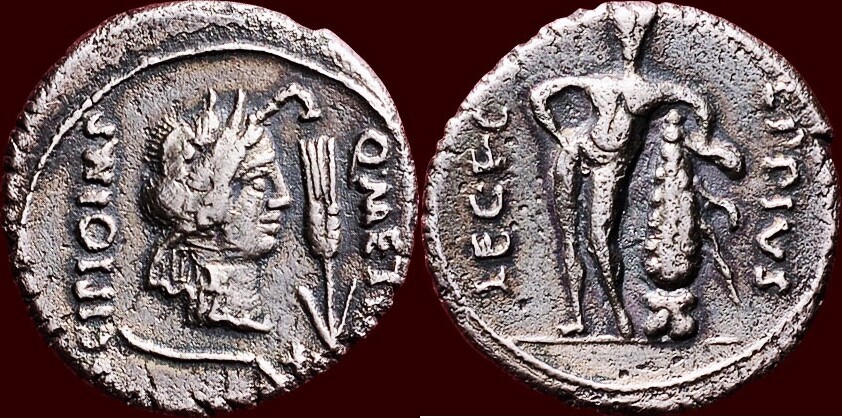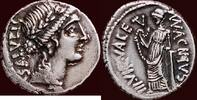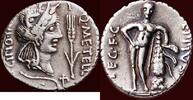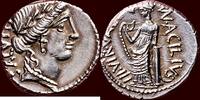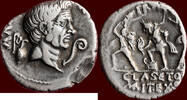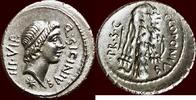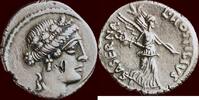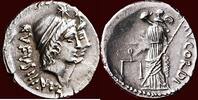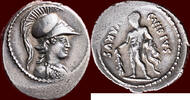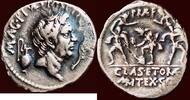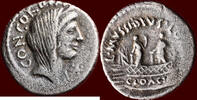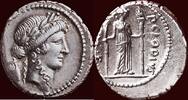MA-ID: 8459402010
Bewertungen Henzen
Schnelle Lieferung. Super Ware. Vielen Dank!
O.K.
perfekt !!!
Great coin, quick delivery, thanks!
AR Denarius (47-46 BC) ROMAN IMPERATORS - QUINTUS CAECILIUS METELLUS PIUS CORNELIANUS SCIPIO NASICA, IMPERATOR 49-46 BC & MARCUS EPPIUS - traveling mi ss
Munthandel G.Henzen 

10
Seit 10 Jahren bei MA-Shops
7244 Bewertungen,
100 % Positiv (seit 24 Monaten)
Weltweiter Versand
695,00 EUR
Differenzbesteuert nach §25a UStG
zzgl. 13,00 EUR Versand ( nach Deutschland )
Lieferzeit: 5 - 8 Tage*
zzgl. 13,00 EUR Versand ( nach Deutschland )
| Bestellhotline +49 (0)2871 2180 383 |
| Zahlungsarten |
| Überweisung |
weight 3,53gr. | silver Ø 18mm.
obv. Laureate head of Africa right, clad in elephant′s skin, ear of corn
before, plough below, Q•METELL on right, SCIPIO IMP on left
rev. Naked Herakles standing facing, his right hand on hip, left resting
on club draped with lion’s skin and set on rock, EPPIVS on right,
LEG•F•C on left
Metellus Scipio was born round 100 BC as Publius Cornelius Scipio Nasica. His grandfather was the P. Cornelius Scipio Nasica Serapio who was consul in 111 BC his father Publius Cornelius Scipio Nasica (born 128 BC) married Licinia Crassa, daughter of the L. Licinius Crassus who was consul in 95 BC. The father died not long after his praetorship (circa 93 BC), and was survived by two sons and two daughters. The brother was adopted by their grandfather Crassus, but left little mark on history. Publius Scipio, as he was referred to in contemporary sources early in his life, was adopted in adulthood through the testament of Quintus Caecilius Metellus Pius, consul in 80 BC and pontifex maximus. He retained his patrician status: this legal process constitutes adoption only in a loose sense Scipio becomes a Caecilius Metellus in name while inheriting the estate of Metellus Pius, but was never his "son" while the pontifex maximus was alive. He was called "Metellus Scipio" but also sometimes just "Scipio" even after his adoption. The official form of his name as evidenced in a decree of the senate was "Q. Caecilius Q. f. Fab. Metellus Scipio."
Metellus Scipio has been listed as tribune of the plebs in 59, but his patrician status argues against his holding the office. It is possible that Scipio′s ′adoption′ into a plebeian gens may have qualified him for a tribunate on a technicality. He was possibly curule aedile in 57 BC, when he presented funeral games in honor of his adopted father′s death six years earlier. He was praetor, most likely in 55 BC, during the second joint consulship of Pompeius and Marcus Crassus. In 53 BC, he was interrex with M. Valerius Messalla. He became consul with Pompeius in 52 BC. Quintus Caecilius Metellus Pius Scipio′s connection by marriage to Pompey the Great earned him the consulship in 52 BC, with the price that he target Julius Caesar through actions in the Senate. As a result, Scipio introduced legislation calling for Caesar to relinquish his command in Gaul and to disband his legions. Caesar ignored the demand and when he crossed the Rubicon in January of 49. By ignoring the ultimatum, Caesar made war inevitable. Scipio fled with Pompey. That same year, he became proconsul of the province of Syria. In Syria and in the province of Asia, where he took up winter quarters, he used often oppressive means to gather ships, troops, and money: He put a per capita tax on slaves and children he taxed columns, doors, grain, soldiers, weaponry, oarsmen, and machinery if a name could be found for a thing, that was seen as sufficient for making money from it.
In 48 BC, he brought his forces from Asia to Greece, where he maneuvered against Gn. Domitius Calvinus and L. Cassius until the arrival of Pompeius. At the Battle of Pharsalus, he commanded the center. After the optimates′ defeat by Caesar, Metellus fled to Africa. With the support of his former rival-in-romance Cato, he wrested the chief command of Pompeius′s forces from the loyal Attius Varus, probably in early 47. This coin was struck during Scipio′s African campaign to pay the soldiers under his command. Quintus Metellus Pius Scipio, despite his illustrious name and the battlefield of Africa (upon which a Scipione was reputedly unbeatable), was just as doomed as the cause he fought for. Shortly after this issue was struck, he held command at the Battle of Thapsus (6 April 46 BC) "without skill or success," and was defeated along with Cato. After the defeat he tried to escape to the Iberian Peninsula to continue the fight, but was cornered by the fleet of Publius Sittius. He committed suicide by stabbing himself so he would not fall at the hands of his enemies. The Battle of Tapsus ended with the total rout of the Pompeians.
The legate Marcus Eppius was a prominent supporter of the Pompeian cause from the time of the outbreak of the civil war in 49 BC. His title ′LEF F C′ is of special interest as it occurs nowhere else on the coinage. The most likely expansion of the abbrevation is ′legatus fisci castrensis′ (′legate of the camp treasury′), which would imply that the mint was a military one. This ′series′ is described as ′crude′. The styling generating statements that..."Scipio must have had difficulty securing talented engravers as this type is typically crudely stylized..." The annoyed expression on Hercules face and his hand on hip stance seem to suggest either the engraver, the ′deity′ or the ′moneyers′ had some significant ′transgender′ issues. Eppius survived Thapsus and we shall meet him again striking for Sextus Pompeius in Spain in 45/44 BC. Eppius survived Thapsus and we shall meet him again striking for Sextus Pompeius in Spain in 45/44 BC.
Crawford 461/1 | Sydenham 1051 | Babelon Caecilia 50
BMCRR Africa 10 | CRI.44 | Albert 1406 | Sear 1380 R
Attractive toning. Rare.
vf
obv. Laureate head of Africa right, clad in elephant′s skin, ear of corn
before, plough below, Q•METELL on right, SCIPIO IMP on left
rev. Naked Herakles standing facing, his right hand on hip, left resting
on club draped with lion’s skin and set on rock, EPPIVS on right,
LEG•F•C on left
Metellus Scipio was born round 100 BC as Publius Cornelius Scipio Nasica. His grandfather was the P. Cornelius Scipio Nasica Serapio who was consul in 111 BC his father Publius Cornelius Scipio Nasica (born 128 BC) married Licinia Crassa, daughter of the L. Licinius Crassus who was consul in 95 BC. The father died not long after his praetorship (circa 93 BC), and was survived by two sons and two daughters. The brother was adopted by their grandfather Crassus, but left little mark on history. Publius Scipio, as he was referred to in contemporary sources early in his life, was adopted in adulthood through the testament of Quintus Caecilius Metellus Pius, consul in 80 BC and pontifex maximus. He retained his patrician status: this legal process constitutes adoption only in a loose sense Scipio becomes a Caecilius Metellus in name while inheriting the estate of Metellus Pius, but was never his "son" while the pontifex maximus was alive. He was called "Metellus Scipio" but also sometimes just "Scipio" even after his adoption. The official form of his name as evidenced in a decree of the senate was "Q. Caecilius Q. f. Fab. Metellus Scipio."
Metellus Scipio has been listed as tribune of the plebs in 59, but his patrician status argues against his holding the office. It is possible that Scipio′s ′adoption′ into a plebeian gens may have qualified him for a tribunate on a technicality. He was possibly curule aedile in 57 BC, when he presented funeral games in honor of his adopted father′s death six years earlier. He was praetor, most likely in 55 BC, during the second joint consulship of Pompeius and Marcus Crassus. In 53 BC, he was interrex with M. Valerius Messalla. He became consul with Pompeius in 52 BC. Quintus Caecilius Metellus Pius Scipio′s connection by marriage to Pompey the Great earned him the consulship in 52 BC, with the price that he target Julius Caesar through actions in the Senate. As a result, Scipio introduced legislation calling for Caesar to relinquish his command in Gaul and to disband his legions. Caesar ignored the demand and when he crossed the Rubicon in January of 49. By ignoring the ultimatum, Caesar made war inevitable. Scipio fled with Pompey. That same year, he became proconsul of the province of Syria. In Syria and in the province of Asia, where he took up winter quarters, he used often oppressive means to gather ships, troops, and money: He put a per capita tax on slaves and children he taxed columns, doors, grain, soldiers, weaponry, oarsmen, and machinery if a name could be found for a thing, that was seen as sufficient for making money from it.
In 48 BC, he brought his forces from Asia to Greece, where he maneuvered against Gn. Domitius Calvinus and L. Cassius until the arrival of Pompeius. At the Battle of Pharsalus, he commanded the center. After the optimates′ defeat by Caesar, Metellus fled to Africa. With the support of his former rival-in-romance Cato, he wrested the chief command of Pompeius′s forces from the loyal Attius Varus, probably in early 47. This coin was struck during Scipio′s African campaign to pay the soldiers under his command. Quintus Metellus Pius Scipio, despite his illustrious name and the battlefield of Africa (upon which a Scipione was reputedly unbeatable), was just as doomed as the cause he fought for. Shortly after this issue was struck, he held command at the Battle of Thapsus (6 April 46 BC) "without skill or success," and was defeated along with Cato. After the defeat he tried to escape to the Iberian Peninsula to continue the fight, but was cornered by the fleet of Publius Sittius. He committed suicide by stabbing himself so he would not fall at the hands of his enemies. The Battle of Tapsus ended with the total rout of the Pompeians.
The legate Marcus Eppius was a prominent supporter of the Pompeian cause from the time of the outbreak of the civil war in 49 BC. His title ′LEF F C′ is of special interest as it occurs nowhere else on the coinage. The most likely expansion of the abbrevation is ′legatus fisci castrensis′ (′legate of the camp treasury′), which would imply that the mint was a military one. This ′series′ is described as ′crude′. The styling generating statements that..."Scipio must have had difficulty securing talented engravers as this type is typically crudely stylized..." The annoyed expression on Hercules face and his hand on hip stance seem to suggest either the engraver, the ′deity′ or the ′moneyers′ had some significant ′transgender′ issues. Eppius survived Thapsus and we shall meet him again striking for Sextus Pompeius in Spain in 45/44 BC. Eppius survived Thapsus and we shall meet him again striking for Sextus Pompeius in Spain in 45/44 BC.
Crawford 461/1 | Sydenham 1051 | Babelon Caecilia 50
BMCRR Africa 10 | CRI.44 | Albert 1406 | Sear 1380 R
Attractive toning. Rare.
vf
Bitte beachten Sie unsere Mindestabnahme von 20 Euro. Sendungen nach China sind auf Gefahr des Käufers und nur Zahlung per banküberweisung. An PayPal und Kreditkarte Zahlungen sind immer Verwaltungs- und Risikokosten verbunden. Sendungen nach Russland, Ukraine und israel sind nicht möglich. Der Versand erfolgt innerhalb von 5 Tagen nach Zahlungseingang. BITTE KEIN PAYPAL ODER KREDITKARTE ZAHLUNGEN FÜR EU. Zahlen Sie bitte immer nur mit IBAN; schnell, billig und zuverlässich.
| Versandkosten | ||||
|---|---|---|---|---|
| bis 100,00 EUR | 100,00 EUR bis 500,00 EUR | 500,00 EUR bis 1000,00 EUR | über 1000,00 EUR | |
| Argentinien | 32,00 EUR | 32,00 EUR | 40,00 EUR | 40,00 EUR |
| Australien | 35,00 EUR | 35,00 EUR | 40,00 EUR | 40,00 EUR |
| Belgien | 9,50 EUR | 11,00 EUR | 13,00 EUR | 18,00 EUR |
| Brasilien | 55,00 EUR | 55,00 EUR | 55,00 EUR | 55,00 EUR |
| Bulgarien | 14,00 EUR | 16,00 EUR | 35,00 EUR | 45,00 EUR |
| Chile | 50,00 EUR | 50,00 EUR | 50,00 EUR | 50,00 EUR |
| China | 40,00 EUR | 40,00 EUR | 50,00 EUR | 50,00 EUR |
| Dänemark | 11,50 EUR | 13,00 EUR | 16,00 EUR | 20,00 EUR |
| Deutschland | 9,50 EUR | 11,00 EUR | 13,00 EUR | 18,00 EUR |
| Estland | 13,00 EUR | 14,00 EUR | 15,00 EUR | 25,00 EUR |
| Frankreich | 9,50 EUR | 11,00 EUR | 16,00 EUR | 25,00 EUR |
| Griechenland | 15,00 EUR | 25,00 EUR | 30,00 EUR | 35,00 EUR |
| Großbritannien | 25,00 EUR | 25,00 EUR | 26,00 EUR | 28,00 EUR |
| Hong Kong | 40,00 EUR | 40,00 EUR | 50,00 EUR | 50,00 EUR |
| Indien | 35,00 EUR | 35,00 EUR | 40,00 EUR | 50,00 EUR |
| Indonesien | 35,00 EUR | 35,00 EUR | 40,00 EUR | 40,00 EUR |
| Israel | 200,00 EUR | 200,00 EUR | 200,00 EUR | 200,00 EUR |
| Japan | 40,00 EUR | 40,00 EUR | 40,00 EUR | 40,00 EUR |
| Kambodscha | 65,00 EUR | 65,00 EUR | 65,00 EUR | 65,00 EUR |
| Kanada | 30,00 EUR | 30,00 EUR | 35,00 EUR | 35,00 EUR |
| Liechtenstein | 20,00 EUR | 20,00 EUR | 25,00 EUR | 25,00 EUR |
| Luxemburg | 11,00 EUR | 13,00 EUR | 16,00 EUR | 25,00 EUR |
| Malaysia | 35,00 EUR | 35,00 EUR | 40,00 EUR | 45,00 EUR |
| Niederlande | 8,50 EUR | 8,50 EUR | 11,00 EUR | 14,00 EUR |
| Norwegen | 25,00 EUR | 25,00 EUR | 30,00 EUR | 35,00 EUR |
| Österreich | 11,50 EUR | 12,50 EUR | 15,00 EUR | 25,00 EUR |
| Polen | 13,00 EUR | 14,00 EUR | 16,50 EUR | 25,00 EUR |
| Portugal | 13,00 EUR | 14,00 EUR | 18,00 EUR | 25,00 EUR |
| Rumänien | 16,00 EUR | 18,00 EUR | 25,00 EUR | 35,00 EUR |
| Russische Föderation | 200,00 EUR | 200,00 EUR | 200,00 EUR | 200,00 EUR |
| Schweiz | 30,00 EUR | 30,00 EUR | 40,00 EUR | 40,00 EUR |
| Serbien | 25,00 EUR | 25,00 EUR | 30,00 EUR | 35,00 EUR |
| Singapur | 35,00 EUR | 35,00 EUR | 35,00 EUR | 40,00 EUR |
| Slowakei | 13,00 EUR | 15,00 EUR | 20,00 EUR | 25,00 EUR |
| Spanien | 11,50 EUR | 13,50 EUR | 16,50 EUR | 25,00 EUR |
| Sri Lanka | 35,00 EUR | 35,00 EUR | 40,00 EUR | 45,00 EUR |
| Tschechische Republik | 12,00 EUR | 14,00 EUR | 18,00 EUR | 25,00 EUR |
| Ukraine | 200,00 EUR | 200,00 EUR | 200,00 EUR | 200,00 EUR |
| Ungarn | 14,00 EUR | 16,00 EUR | 25,00 EUR | 30,00 EUR |
| Vereinigte Staaten von Amerika | 32,00 EUR | 32,00 EUR | 35,00 EUR | 40,00 EUR |
| Europäische Union | 15,00 EUR | 17,00 EUR | 25,00 EUR | 30,00 EUR |
| Welt | 40,00 EUR | 40,00 EUR | 50,00 EUR | 50,00 EUR |
Informationen zum Kauf bei MA-Shops
Bestellungen bei MA-Shops sind jederzeit möglich und werden innerhalb von 2-4 Arbeitstagen verschickt.
Ein über die MA-Shops abgesicherter Kauf findet niemals außerhalb von MA-Shops statt.
Bestellen Sie sicher online mit dem MA-Shops Warenkorb.
Vielen Dank.
Ein über die MA-Shops abgesicherter Kauf findet niemals außerhalb von MA-Shops statt.
Bestellen Sie sicher online mit dem MA-Shops Warenkorb.
Vielen Dank.
|
Verkäufer-Startseite | 0Warenkorb | AGB | Impressum | MA AGB | Datenschutzerklärung | Garantie | MA-Shops Neuzugänge Copyright ® 2001-2025, MA-SHOPS Muenzen All Rights Reserved. Designated trademarks and brands are the property of their respective owners. |
 Münzen beim Fachhändler kaufen
Münzen beim Fachhändler kaufen



